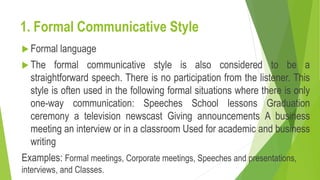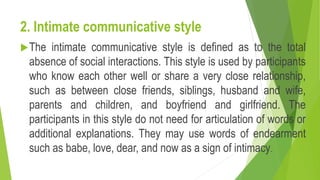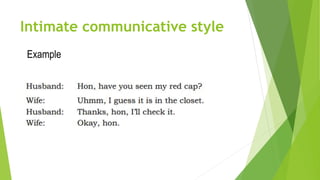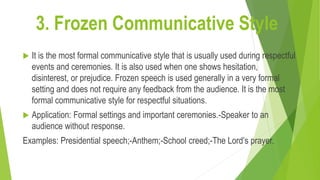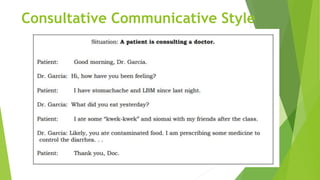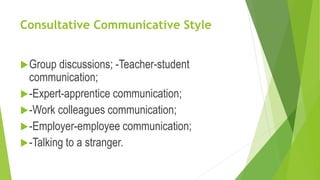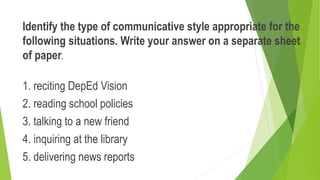9.pptx
- 3. 1. Formal Communicative Style ïĩ Formal language ïĩ The formal communicative style is also considered to be a straightforward speech. There is no participation from the listener. This style is often used in the following formal situations where there is only one-way communication: Speeches School lessons Graduation ceremony a television newscast Giving announcements A business meeting an interview or in a classroom Used for academic and business writing Examples: Formal meetings, Corporate meetings, Speeches and presentations, interviews, and Classes.
- 4. 2. Intimate communicative style ïĩThe intimate communicative style is defined as to the total absence of social interactions. This style is used by participants who know each other well or share a very close relationship, such as between close friends, siblings, husband and wife, parents and children, and boyfriend and girlfriend. The participants in this style do not need for articulation of words or additional explanations. They may use words of endearment such as babe, love, dear, and now as a sign of intimacy.
- 6. 3. Frozen Communicative Style ïĩ It is the most formal communicative style that is usually used during respectful events and ceremonies. It is also used when one shows hesitation, disinterest, or prejudice. Frozen speech is used generally in a very formal setting and does not require any feedback from the audience. It is the most formal communicative style for respectful situations. ïĩ Application: Formal settings and important ceremonies.-Speaker to an audience without response. Examples: Presidential speech;-Anthem;-School creed;-The Lordâs prayer.
- 8. 4. Casual Communicative Style ïĩThe casual communicative style uses language used between friends, peers, colleagues, or family. Used informal conversation so, the participants may use group language only members of the group can understand. Jargon, slang, or vernacular language are used. Example: Chats with friends and family. Casual phone calls or text messages.
- 10. 5. Consultative Communicative Style ïĩ The consultative speech style happens in two-way participation. It is used in semi-formal situations in which a speaker needs to provide background information. The listener participates by giving feedback. Thus, both the speaker and the listener are active participants.
- 12. Consultative Communicative Style ïĩGroup discussions; -Teacher-student communication; ïĩ-Expert-apprentice communication; ïĩ-Work colleagues communication; ïĩ-Employer-employee communication; ïĩ-Talking to a stranger.
- 13. Identify the type of communicative style appropriate for the following situations. Write your answer on a separate sheet of paper. 1. reciting DepEd Vision 2. reading school policies 3. talking to a new friend 4. inquiring at the library 5. delivering news reports
- 14. 6. asking something from your neighbor 7. talking to your groupmates 8. delivering a valedictory address 9. talking and laughing about memorable experiences 10. sending an inquiry to your teacher through messenger


